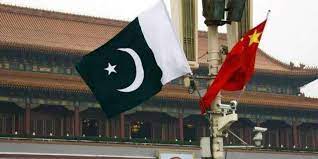
China calls for protection of Pakistan projects, peaceful end to Kashmir Dispute
China has reiterated its call for a peaceful resolution to the Kashmir dispute and the protection of Chinese investments in Pakistan, as Prime Minister Shehbaz Sharif wrapped up a two-day official visit to Beijing.
The 47-point joint statement, released after what was Sharif’s first trip to China since taking office in April, saw the two countries pledge cooperation on a wide range of areas, from disaster relief to trade and investments and security.
Sharif was the second foreign leader – after Vietnamese Communist Party chief Nguyen Phu Trong – to visit China since last month’s 20th Communist Party congress. The landmark five-yearly event ended with President Xi Jinping securing a norm-breaking third term and a wide-ranging reshuffle of the country’s top leadership.
Meeting at Beijing’s Great Hall of the People on Wednesday, Xi and Sharif reaffirmed the “all-weather strategic partnership” between the two countries, as Xi said Pakistan would be “always prioritised” in China’s diplomacy with neighbouring countries.
Beijing provided more than 644 million yuan (US$88 million) in aid as Pakistan battled a deadly and devastating flood season this year, apart from sending in disaster relief supplies and flood control experts. More such help could be on the way, as China has pledged to help with reconstruction efforts following the disaster.
The two sides also agreed to continue to push forward cooperation on Belt and Road Initiative projects. Receiving special mention were upgrades to the Main Line 1 Karachi-Peshawar railway project, and the development of Gwadar port, a key regional junction under the China-Pakistan Economic Corridor (CPEC), the framework for belt and road projects in the region.
Key agreements have also been signed on e-commerce and the digital economy. In a statement on Wednesday, China’s central bank said it had signed a memorandum of cooperation with the State Bank of Pakistan to establish renminbi (RMB) clearing arrangements, expected to facilitate bilateral trade and investments using the Chinese currency.
The joint statement did not touch on Pakistan’s debt issues, though Pakistani media reports earlier said Sharif was expected to ask for China’s help on this. Pakistan, as one of the most debt-distressed developing nations, is said to be on the brink of default while also facing high inflation rates at home.
Days before Sharif’s visit, Pakistan requested China to roll over US$6.3 billion in debt maturing in eight months, as part of a plan to arrange US$34 billion to meet debt obligations in the financial year ending next June.
The two countries also vowed to strengthen security and law enforcement cooperation, including joint military exercises and military technology.
Pakistan pledged it would “make every effort” to ensure safety of all Chinese personnel and infrastructure projects in the country after Xi raised concerns over this during his meeting with Sharif.
Chinese infrastructure and workers in Pakistan have faced a series of local militant attacks over the past year.
Three Chinese nationals were killed in a suicide attack carried out by the Balochistan Liberation Army at the Confucius Institute in Karachi in April.
A bus bombing in July last year, allegedly carried out by the Pakistani Taliban militant group, claimed the lives of nine Chinese engineers working on the Dasu dam, a belt and road project in Pakistan’s Khyber Pakhtunkhwa province.
Amit Ranjan, research fellow at the National University of Singapore’s Institute of South Asian Studies, said Chinese investments will keep coming despite some safety concerns, as Pakistan will work hard to clear Beijing’s worries given its strong economic reliance on it.
“The Pakistani establishment knows that China is the only country on which it can blindly depend and blindly trust. And if the Chinese also feel that, no, we are not going to invest or we are not going to send our personnel to Pakistan, that will be bad for Pakistan,” he said.
China also reaffirmed its stance on the Jammu and Kashmir border dispute between India and Pakistan, urging “sincere dialogue” and a peaceful resolution through the UN and bilateral agreements.
In 2019, Beijing voiced opposition after India revoked the special status of Jammu and Kashmir as an autonomous state, a move that also involved a disputed China-India border region. China hit out at India for unilaterally changing the status quo of the disputed area, saying it had hurt “Chinese sovereignty” and calling for Pakistani territory to be respected.
Ranjan believes that China is likely to maintain a neutral stance going forward, despite its close relations with Pakistan and tensions with India over their own border issue in Ladakh.
“I don’t think that China wants Pakistan to take some serious steps to resolve the [Kashmir] issue … because they know that its repercussions will be very bad,” he said.
The statement also touched on the security situation in Afghanistan, with both sides agreeing to continue to provide humanitarian and economic assistance to Kabul and pushing for expansion of the CPEC in Afghanistan.

